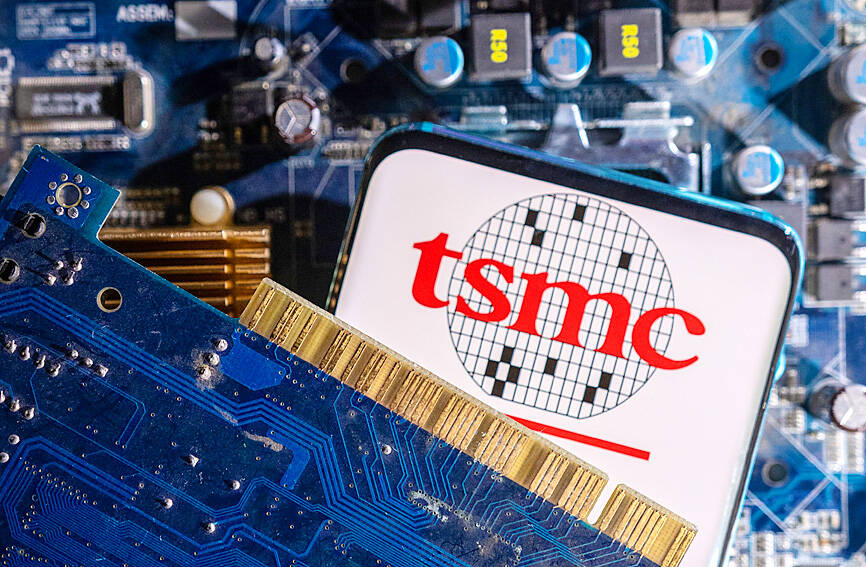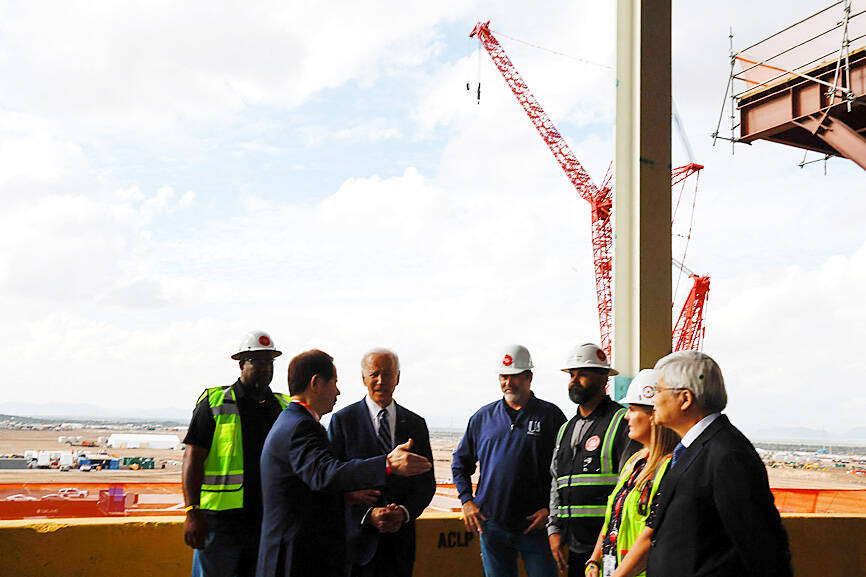Taiwan Semiconductor Manufacturing Co (TSMC, 台積電) is studying the feasibility of a fab in Europe, the chipmaker said in response to a Taiwanese media report stating that it is planning to build a plant in Dresden, Germany.
The Chinese-language Commercial Times reported yesterday that the company has chosen the German semiconductor hub of Dresden for a fab, with production slated to start in 2025.
The report said the investment in Germany would meet strong European demand for TSMC’s specialty processes and mitigate potential geopolitical barriers.

Photo: Reuters
Citing sources from within TSMC’s supply chain, the report said the proposed fab would make use of Dresden’s comprehensive semiconductor ecosystem and better serve its EU clients.
Major international semiconductor firms including Infineon Technologies AG, Robert Bosch GmbH, GlobalFoundries Inc, X-Fab Silicon Foundries SE and NXP Semiconductors NV have run fabs in Dresden, while semiconductor equipment suppliers, including Applied Materials Inc, ASML Holding NV and Siltronic AG have also established production bases in the city.
TSMC is building fabs in Arizona to manufacture chips using 4-nanometer (nm) and 3nm processes, with mass production scheduled to begin next year.

Photo: Reuters
It is also building a plant in Japan that is to use the company’s 12nm, 16nm and 22nm processes, as well as 28nm specialty technology, with commercial production expected to start next year.
TSMC last week said it considers clients’ needs and available government support when choosing locations for new ventures.
It is considering building a fab in Germany to develop chips used in automotive electronics and specialty processes, TSMC said, adding that a second fab in Japan is also being discussed.
The company is assessing plans for a German plant and no decision has been made, TSMC spokeswoman Nina Kao (高孟華) said.
However, an editorial published yesterday by Taiwan’s Central News Agency (CNA) said that the EU should not get a Taiwanese semiconductor plant if the European Commission does not engage in trade talks with Taipei.
The EU seeks chip investments to safeguard its supply chain, but without help from the likes of TSMC and Intel Corp, the EU could find it difficult to secure advanced chipmaking capabilities, the editorial said.
“The EU wants Taiwan to set up chip plants, but for Taiwan there is no need to do so from a corporate perspective,” CNA wrote. “If the EU only wants chips from Taiwan but shies away from talking diplomacy, will Taiwan, with its global strategic assets, be this naive?”
Tensions between Beijing and Taipei have escalated as the US asserts its power to counter China’s influence in the region.
Taiwan’s dominant role in the global market for advanced chips is boosting its strategic position, while the country has been aggressively seeking to deepen trade and other relations with the West.
The CNA editorial also criticized an EU official for saying that the 27-member bloc did not need a bilateral investment agreement with Taiwan.
European External Action Service Asia Pacific managing director Gunnar Wiegand on Wednesday last week said that stable conditions and a well-functioning legal system in Taiwan meant it was “rational” for the EU not to seek such an agreement.

Macronix International Co (旺宏), the world’s biggest NOR flash memory supplier, yesterday said it would spend NT$22 billion (US$699.1 million) on capacity expansion this year to increase its production of mid-to-low-density memory chips as the world’s major memorychip suppliers are phasing out the market. The company said its planned capital expenditures are about 11 times higher than the NT$1.8 billion it spent on new facilities and equipment last year. A majority of this year’s outlay would be allocated to step up capacity of multi-level cell (MLC) NAND flash memory chips, which are used in embedded multimedia cards (eMMC), a managed

In Italy’s storied gold-making hubs, jewelers are reworking their designs to trim gold content as they race to blunt the effect of record prices and appeal to shoppers watching their budgets. Gold prices hit a record high on Thursday, surging near US$5,600 an ounce, more than double a year ago as geopolitical concerns and jitters over trade pushed investors toward the safe-haven asset. The rally is putting undue pressure on small artisans as they face mounting demands from customers, including international brands, to produce cheaper items, from signature pieces to wedding rings, according to interviews with four independent jewelers in Italy’s main

CULPRITS: Factors that affected the slip included falling global crude oil prices, wait-and-see consumer attitudes due to US tariffs and a different Lunar New Year holiday schedule Taiwan’s retail sales ended a nine-year growth streak last year, slipping 0.2 percent from a year earlier as uncertainty over US tariff policies affected demand for durable goods, data released on Friday by the Ministry of Economic Affairs showed. Last year’s retail sales totaled NT$4.84 trillion (US$153.27 billion), down about NT$9.5 billion, or 0.2 percent, from 2024. Despite the decline, the figure was still the second-highest annual sales total on record. Ministry statistics department deputy head Chen Yu-fang (陳玉芳) said sales of cars, motorcycles and related products, which accounted for 17.4 percent of total retail rales last year, fell NT$68.1 billion, or

In the wake of strong global demand for AI applications, Taiwan’s export-oriented economy accelerated with the composite index of economic indicators flashing the first “red” light in December for one year, indicating the economy is in booming mode, the National Development Council (NDC) said yesterday. Moreover, the index of leading indicators, which gauges the potential state of the economy over the next six months, also moved higher in December amid growing optimism over the outlook, the NDC said. In December, the index of economic indicators rose one point from a month earlier to 38, at the lower end of the “red” light.